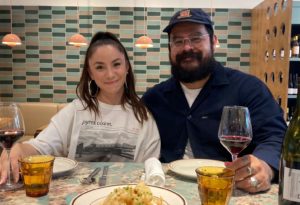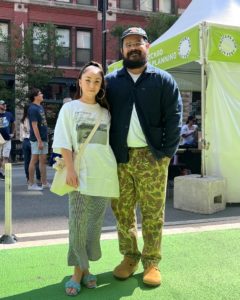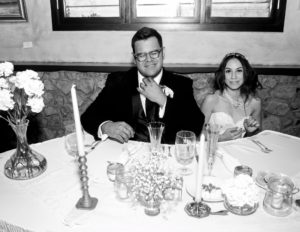Avatar of Shared Decision Making in Healthcare
Polo Camacho
Late in the evening with Saturday Night Live on in the background, shortly after graduating from the University of Kansas in May 2021 with a doctorate in philosophy, Polo Camacho was scouring the internet for job openings.
Not interested in an academic career, he remarked to his wife Vicky Diaz-Camacho, “Wouldn’t it be cool if there was a bioethics center that didn’t concentrate on publishing but did applied bioethics work in the community?”
Lo and behold, there was. The Center for Practical Bioethics was advertising for the new position of Health Ethics and Community Engagement Program Manager.
“It was exactly what I was looking for,” said Polo. “When I tell people this was my dream job, it really was.”
Truth Searcher
People attracted to work in ethics and bioethics tend to have certain personality traits in common. They’re drawn to the search for truth, open to new ideas and comfortable with ambiguity.
Polo was all of those things as a student at a non-denominational Christian school through high school in El Paso, Texas, where all of those things were actively discouraged.
“History at my school emphasized how Europeans were sent by God to discover new territory and colonize the Americas,” said Polo. “Darwin got a short paragraph concluding that he was a sinner. My favorite classes were math, art and drama.”
Polo actively volunteered at the church affiliated with the school until the gulf between what the church taught and what he truly believed – or didn’t believe – was too at odds with his core values.
“I went from being worship leader to literally walking off the stage one Sunday and saying I’m out of there.”
The Central Dogma
 From the moment he decided to major in Philosophy for his Bachelor’s Degree at the University of Texas at El Paso, Polo’s goal was eventually to earn his PhD. In 2013, he landed as a doctoral student in the Philosophy Department at the University of Kansas in Lawrence, where his interest in science and the conclusions we draw from it led his dissertation on the Central Dogma.
From the moment he decided to major in Philosophy for his Bachelor’s Degree at the University of Texas at El Paso, Polo’s goal was eventually to earn his PhD. In 2013, he landed as a doctoral student in the Philosophy Department at the University of Kansas in Lawrence, where his interest in science and the conclusions we draw from it led his dissertation on the Central Dogma.
Polo explains, at its simplest, the Central Dogma posits that DNA makes RNA makes proteins. This process, however, doesn’t work the other way around. According to the Central Dogma, you can’t go from proteins to RNA to DNA. This is a fundamental principle in the life sciences.
Polo’s dissertation asks three questions. First, is the Central Dogma accurate? Is that really how cell biology works? Second, is it practical? Is it useful even if not entirely accurate? And third, is it ethical? Is it morally responsible to operate under the assumption that DNA makes protein and not the other way around? Could the Central Dogma be used, for example, to promote morally reprehensible ideas, like eugenics or racism?
Questioning assumptions like these about science prepared Polo well for his work at the Center questioning assumptions we make about health and healthcare.
At the Center, Polo works with communities to ensure that their rights and preferences are being upheld within the medical system.
Shared Decision Making
“The Center recognizes that Advance Care Planning has mostly catered to white, English-speaking individuals, even though different communities have different values, needs and relationships with the medical system. Latinos by and large hold different values with respect to family, personal identity and caregiving. Language is important. Culture is important. Being sensitive to those things matters.”
The initiative he currently leads is developing Advance Care Planning workshops and resources for the Latino community in Kansas City in partnership with El Centro, Inc.
Encouraging shared decision making and protecting the interests of those whose voices are not heard or heeded is a common thread in all of Polo’s work at the Center.
He oversees the Center’s role in sponsoring TPOPP (Transportable Physician Orders for Patient Preferences), which is the Kansas and Missouri version of POLST (Physician Orders for Life-Sustaining Treatment). POLST is a voluntary national Advance Care Planning program that seeks to better align treatment plans with goals and values of frail and seriously ill patients with life-limiting illness.
He also develops educational programs and resources for the Ethics Committee Consortium, whose members represent more than 300 ethics committees in Kansas, Missouri and across the country, and he leads the Governance and Accountability Committee for the Ethical AI Initiative, which is working to identify ethical problems and risks associated with artificial intelligence in healthcare and to design, pilot and disseminate interventions that mitigate problems and risks.
Cost, Racism and Paternalism
In Polo’s opinion, the number one issue in bioethics today is cost. A third of bankruptcies in the U.S., he points out, are medical. When his siblings needed certain medical treatments, his parents took them to Mexico where the cost was a fraction of what they would have had to pay in the United States.
The number two issue, he said, is institutional and non-institutional racism.
“Not only systemic but direct, and it’s the direct racism – assuming certain things about race and culture – that makes shared decision making impossible.”
Number three is medical paternalism, which he says, “is almost expected in underserved communities and closely related to the cost issue. Language barriers and a general lack of cultural sensitivity can perpetual medical paternalism.
“Because if a person is discriminated against by a provider but cost was not a barrier, they could seek care elsewhere. And even then, gaining access to ‘somewhere else’ is not a simple or easy process. They may encounter the same paternalism that led them there in the first place.”

Shared Interests
As Polo looks to the future, he wants to continue work to help medical providers view their patients with fewer biases and more cultural sensitivity.
He and Vicky reside in Lawrence, Kansas, where they share a love of art, music, good food, natural wine, great coffee – they met on MySpace talking about coffee – and house music. In 2023, they hope to celebrate their 10th anniversary in Oaxaca, Mexico.
Vicky’s work as a community reporter for Flatland, the digital journalism arm of Kansas City PBS, focuses on arts and culture. She was recently nominated for three regional Emmy Awards for her community work.


